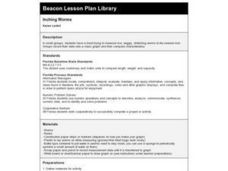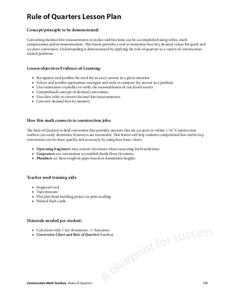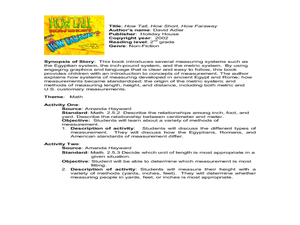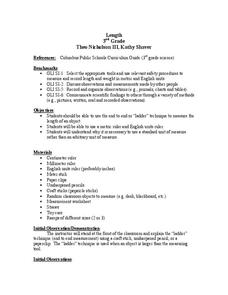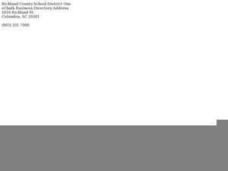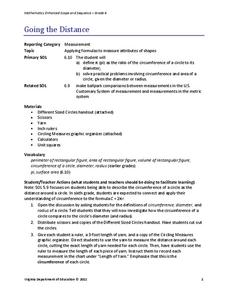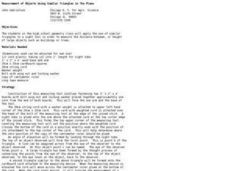Curated OER
Inching Worms
Third graders have a blast trying to measure live, wiggly, stretching worms to the nearest inch. Groups record their data onto a class graph and then compare characteristics. They share their findings with the rest of the class. Fun lesson!
Curated OER
Rule of Quarters
Students memorize four key decimal values for quick and accurate conversion. They convert decimal foot measurements to inches and fractions using math tables, computation or memorization. They memorize decimal foot conversions.
Curated OER
Measuring Body Parts
Students engage in a lesson plan to measure body parts. They use the measuring tape to record the data of body measurements. Students must choose the appropriate unit of measurement and compare the data for the different parts of the...
Curated OER
Measurement Mania
First graders measure 10 different objects found in the classroom, including their own hands and feet, then record their findings. This is a fun lesson for students to experience measurement using a ruler and unifix cubes.
Curated OER
Measure Me!
Third graders use nonstandard concrete methods to estimate and record measurements of their body.
Curated OER
Measurement
Second graders practice measuring the lengths of objects. In this measurement lesson, 2nd graders use paper clips to measure objects in the classroom. Students use larger paper clips first and record their answers, then use the smaller...
Curated OER
How Hot Is Hot In Namib?
Students research and demonstrate the temperatures of the Namibian Desert. They watch and discuss a video, conduct an experiment to demonstrate the desert temperatures, record their results in the form of a graph, and compare/contrast...
Curated OER
How Tall, How Short, How Faraway
Second graders determine the correct unit of measure to use for different situations. In this measuring instructional activity, 2nd graders are introduced to different unit of measure. Students study the origin of measurement and...
Curated OER
Length
Third graders examine and explore a variety of ways to measure length. They discuss how to measure large objects using the end-to-end method, and in small groups measure the length of the room using the end-to-end method with a...
Curated OER
Finding the Sum of the Exterior and Interior Angles of a Polygon
Students find the sum of the angles of a polygon and construct a polygon given the number of sides. In this polygon lesson plan, students draw large polygons on the floor of the room. They measure the length of each side and the interior...
Curated OER
Filling the Glass (Water, Air, and Fractions)
Learners predict which of two glasses is 1/2 full using visual estimation, height measurement, and liquid measurement methods. Mathematical equations to accurately solve the problem are determined and verified.
Curated OER
Size Riddles
Students investigate shapes and sizes by creating a riddle. In this geometry instructional activity, students read one of two books and investigate facts about an object's size. Students write a riddle using the facts they...
Curated OER
Body Part Measurements
Second graders participate in a review of how to use rulers and yard sticks while collecting measurement information. They measure assigned body parts and chart the data on collection sheets. They make a spreadsheet with the information...
Curated OER
Inching Our Way through Measurement
Students review how to use an inch ruler and listen to the story, Inch by Inch by Leo Lionni. In this measuring lesson plan, students work in small groups to create an Inch Poster. Students then use an inch ruler to measure different...
Curated OER
Measuring for Perimeter
Third graders find the perimeter of a polygon. In this measurement activity, 3rd graders use yardsticks to measure straight-lined objects to the nearest 1/2 inch. Student choose a "mystery object," find the perimeter, and record it on...
Curated OER
Worksheet: Measurement (Reading a Standard Ruler)
In this math worksheet, students learn to read a standard ruler to the nearest one sixteenth of an inch. Students examine a ruler drawing and answer 4 questions.
Curated OER
How Big is Barbie?
Students measure various dimensions of a male and a female dolls body and scale them proportionally to average human measurements. They calculate the appropriate scale factor (magnitude) to enlarge their doll and apply that scale factor...
EngageNY
Ratios of Fractions and Their Unit Rates 2
Remodeling projects require more than just a good design — they involve complex fractions, too. To determine whether a tiling project will fit within a given budget pupils calculate the square footage to determine the number of...
Virginia Department of Education
Going the Distance
Estimate the value of one of the most famous irrational numbers. The hands-on lesson instructs classmates to measure the circumference and diameters of circles using yarn. The ratio of these quantities defines pi.
Civil War Trust
Map the Civil War
Mapmaking was a very important element in successfully planning attacks on enemies during the Civil War. Guide pupils through the process of pacing to find the average length of their steps, measure the distance between one object...
Curated OER
Measurement of Objects Using Similar Triangles in The Plane
Students use similar triangles and a sight tool to find the height and distance between large objects. In this similar triangles lesson plan, students use a constructed sight tool to measure the distance and height of an object using an...
Curated OER
Measuring Animal Sizes (and Relative Sizes in our Animal Environment)
Students discover the actual size and weight of many insects and animals. In this biology lesson, students investigate animals and insects to determine their actual weight and size. In groups, students create an animal or insect of their...
Curated OER
Planets in a Bottle
Students experiment with yeast. In this environmental conditions lesson students test the viability of samples of yeast. Students investigate the effects of environmental conditions on the yeast.
Curated OER
Causal Patterns in Ecosystems Section 3
Students design and create a worm and worm free compost tanks for observation of decay in ecosystems. They make predictions, care, and revist tanks using their journals for observation and data collection.
